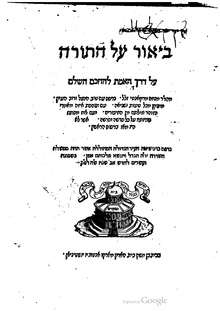Menahem Recanati

Title page of the first edition of Rabbi Recanati's commentary on the Torah (Venice, 1523)
Menahem ben Benjamin Recanati (1223–1290)[1] (Hebrew: מנחם בן בנימין ריקנטי) was an Italian rabbi who flourished during the thirteenth century . He devoted the chief part of his writings to the Kabbala.[2]
Description
Menahem Recanati was born in Recanati in 1223 and he died in Recanati in 1290 . In addition to the halachic rulings collected in Piskei Recanati (his only halachic work), Recanati wrote a kabbalistic commentary on the Torah, a commentary on the siddur, and discussions of the commandments. Piskei Recanati was first published in Bologna, 1538, and was published several times thereafter.
Works
Recanati wrote:
- Perush 'Al ha-Torah (Venice, 1523), a work full of mystical deductions and meanings based upon a textual interpretation of the Bible; it describes many visions and celestial revelations claimed to have been experienced by the author, who was influenced by cabalistic ideas, and expresses the highest respect for all cabalistical authors, even the most recent apocryphal ones. The work was republished with a commentary by Mordecai Jaffe, at Lublin in 1595[2][3] and was also translated into Latin by Pico di Mirandola.[2]
- Perush ha-Tefillot and Ṭa'ame ha-Miẓwot, published together (Constantinople, 1543–1544; Basel, 1581). Like the preceding work, these are strongly tinctured with German mysticism. Recanati frequently quotes Judah he-Hasid of Regensburg, Eleazar of Worms, and their disciples, and alludes also to the Spanish cabalists, Nahmanides among them. He is rarely original, quoting almost always other authorities. Although Recanati had a high reputation for sanctity, he exercised less influence on his contemporaries than upon posterity. To assist him in his cabalistic researches, he studied logic and philosophy; and he endeavors to support the cabala by philosophical arguments.[2]
- Pisḳe Hilkot, Bologna, 1538.[2]
References
- Menahem Recanati – Commentary on the Daily Prayers: Flavius Mithridates’ Latin Translation, the Hebrew Text, and an English Version, edited with introduction and notes by Giacomo Corazzol, two volumes, 860 pages. [THE KABBALISTIC LIBRARY OF GIOVANNI PICO DELLA MIRANDOLA 3, Giulio Busi, general editor] Torino: Nino Aragno Editore, 2008.
- ↑ https://books.google.com/books?id=81pbBgAAQBAJ&pg=PA146&lpg=PA146&dq=menahem+recanati+1223&source=bl&ots=iRNPX_IUca&sig=Dk8FmpTVPqorfsf9AtdkBQpc2NY&hl=en&sa=X&ved=0ahUKEwjb2MCYq5zYAhWISd8KHZfwAbgQ6AEILTAC#v=onepage&q=menahem%20recanati%201223&f=false
- 1 2 3 4 5

Jewish Encyclopedia bibliography:- Moritz Güdemann, Gesch. ii. 180 et seq.;
- Zunz, Literaturgesch. p. 369;
- idem, in Geiger's Jüd. Zeit. iv. 139;
- Gedaliah ibn Yaḥya, Shalshelet ha-Ḳabbalah, p. 48b
- ↑ לבֿושׁי אור יקרותֿ [Mordecai Jaffe's commentary on Recanati] (in Hebrew). Lublin. 1595. OCLC 233048483. Retrieved Jan 20, 2016.
This article is issued from
Wikipedia.
The text is licensed under Creative Commons - Attribution - Sharealike.
Additional terms may apply for the media files.